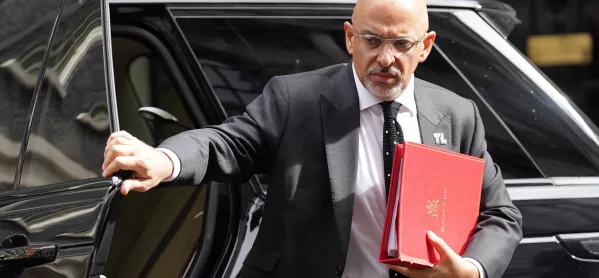Latest pay offer ‘unacceptable’, say teacher leaders

Teachers’ leaders have said government plans to give most teachers a pay rise of 5 per cent do not “come close” to what is needed.
On Friday, The Telegraph reported that education secretary Nadhim Zahawi is planning to give early career teachers a rise of 9 per cent in the first five years of their career, as part of plans to raise starting salaries to £30,000.
Mr Zahawi is also planning a pay rise of 5 per cent for the remaining 380,000 teachers across the UK to avoid the risk of strike action, rather than 3 per cent as originally planned.
He has written to chancellor Rishi Sunak to propose the increase.
- Unions: Plan for supply teachers to cover strikes ‘doesn’t add up’, Zahawi told
- Unions: Teaching unions prepared to ballot for strike over pay
- Teacher pay: What the DfE’s plans mean for you
- Rail strikes and exams: What you need to know
The Department for Education’s submission to the School Teachers’ Review Body (STRB) had suggested that more experienced teachers receive pay rises of between 2 and 3 per cent, which unions have said is too low given rising inflation rates.
The NASUWT and NEU teaching unions, which have threatened strikes in autumn over pay, have said that the proposed increase of 5 per cent for more experienced staff is too low.
The NEU has previously written to Mr Zahawi calling for “inflation-plus” pay rises.
“We have to tell you that failing sufficient action by you, in the autumn term, we will consult our members on their willingness to take industrial action. And we will be strongly encouraging them to vote yes,” the letter said.
NASUWT has said it will hold a national strike ballot if the government fails to “deliver pay restoration for teachers”.
Mary Bousted, joint general secretary of the NEU, said that she would await the government’s formal response to the STRB at the end of the month but that 9 per cent for starting teachers was “only 1 per cent more than expected”, while 5 per cent for more experienced staff was “unacceptable”.
“Nine per cent for beginner teachers does not really shift the dial on the government’s plan to reach a £30,000 starter salary within two years. In that time, however, teachers will have experienced the intense and excessive workload that leads to almost a third quitting within five years of qualifying,” she said.
She added that more experienced teachers had been “subjected to poor pay deal after poor pay deal for many years, and for them, a 5 per cent deal would be unacceptable”.
“It is well below the current RPI inflation of 11.7 per cent. What we need to see is an inflation-plus pay increase for all teachers.
“Teacher pay has fallen by a fifth in real terms since 2010. Combine this with the high workload - and among the highest unpaid working hours - and it is no wonder there is a major problem with recruitment and retention,” she said.
“With training numbers through the floor, this has profound consequences for our education system. Add to this schools struggling to make ends meet through periods of underfunding, additional Covid security, and now the cost-of-living crisis.”
And Patrick Roach, general secretary of NASUWT, said the plans “did not come close” to what was needed.
Dr Roach said it was “extraordinary” that the government had chosen to delay publication of the pay review body report and that ministers had refused to “engage in dialogue directly with the profession”.
“The deepening cost of living crisis together with 12 years of real-terms cuts to teachers’ pay require a genuine commitment to pay restoration for teachers starting in September,” he said.
“A typical classroom teacher is today £40,000 worse off than they would have been had their pay kept pace with inflation over the last decade.
“Talk of a pay award of 5 per cent for the vast majority of teachers doesn’t come close to what is needed.”
Geoff Barton, general secretary of the Association of School and College Leaders, said that ASCL was “not entirely sure what is new about this” given that the DfE submission to the STRB in March proposed a two-year pay award of 8.9 per cent and then 7.1 per cent to teacher starting salaries as part of the commitment to raise them to £30,000.
“The trouble is that it also proposed lower pay awards for other pay points tapering down to 3 per cent and then 2 per cent for teachers on the upper pay scale and for leaders - which is significantly below inflation and represents another effective pay cut,” he added.
“This is on top of pay erosion since 2010 which has seen the real value of salaries fall by a fifth and is one of the main drivers of a teacher shortage crisis that is hitting our schools.
“We are seeking an across-the-board pay award which matches inflation and which also begins to address this long-term attack on teacher pay. We simply must have enough teachers to put in front of classes.”
Earlier this week, Tes reported concerns that there are not enough supply agency teachers to cover gaps if teachers go on strike.
Register with Tes and you can read two free articles every month plus you'll have access to our range of award-winning newsletters.
Keep reading with our special offer!
You’ve reached your limit of free articles this month.
- Unlimited access to all Tes magazine content
- Save your favourite articles and gift them to your colleagues
- Exclusive subscriber-only stories
- Over 200,000 archived articles
- Unlimited access to all Tes magazine content
- Save your favourite articles and gift them to your colleagues
- Exclusive subscriber-only stories
- Over 200,000 archived articles
topics in this article



